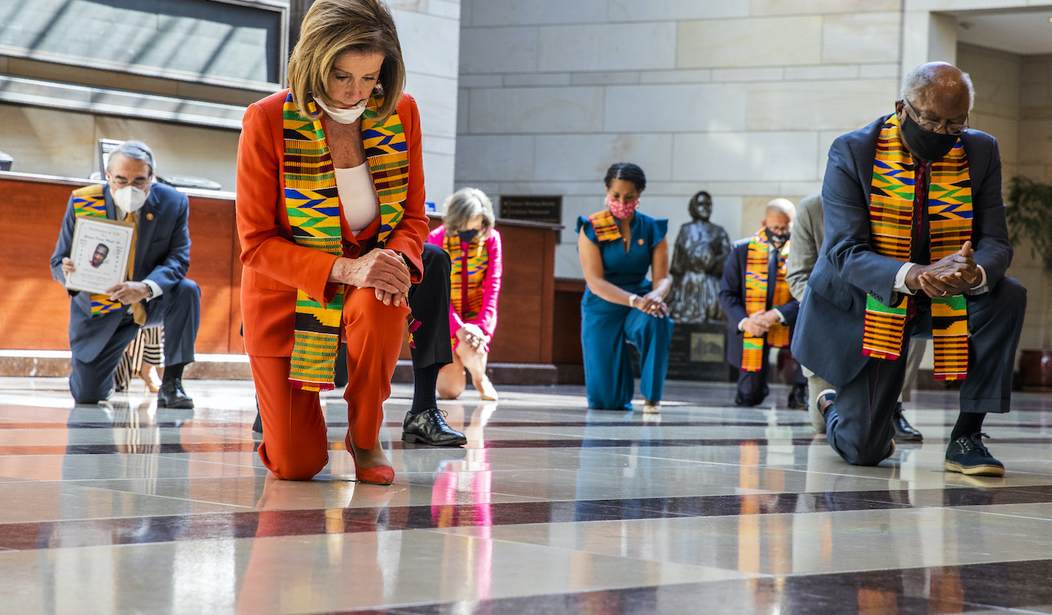Oh, dear lord. It’s now more embarrassing than ever. In the wake of the George Floyd riots, Congressional Democrats held a moment of silence for him wearing Kente cloth. The photo op was staged at Emancipation Hall at the U.S. Capitol. Kente is a traditional African garb. To be more specific, it’s very significant to those of Ghanaian descent. If you want a classic example of cultural appropriation, this is it. And yes, it was trashed by a lot of folks who saw right through this gross exercise in pandering. Floyd was killed on May 25 after he was arrested by Minneapolis Police. His death set off demonstrations, most of which devolved into rioting, nationwide, with anarchists, Antifa, and Black Lives Matter coming together once again to create mayhem, though its mostly Antifa and anarchist groups. Some of these clowns actually seized a portion of Seattle. It’s dying down, but this Kente fiasco just got even more embarrassing.
Congressional Democrats take a knee as they observe a nearly nine minute moment of silence for George Floyd at Emancipation Hall at the U.S. Capitol. https://t.co/JnqDlzMFDq pic.twitter.com/8CBdgtLUjz
— ABC News (@ABC) June 8, 2020
Great work, team! pic.twitter.com/mk3BTwkOcb
— Stephen L. Miller (@redsteeze) June 17, 2020
I’m sure??someone told them that fabric represents black people but in truth a Nigerian like me cannot lay claim to this significant fabric which is very much a part of Ghanaian identity.
— Obianuju Ekeocha (@obianuju) June 8, 2020
Dear democrats,these colors & patterns belong to ancient tribes and mean something to us. pic.twitter.com/nuB1RPBtQA
It’s the garb that historically was worn by rich African slave traders and owners (via USA Today):
A popular legend claims creators of kente cloth presented the cloth to Asantehene Osei Tutu, the Asante kingdom's first leader. Tutu named the cloth “kente,” meaning basket, and adopted the fabric as a royal cloth for special occasions.
Tutu, who lived from 1660 to 1712 or 1717, unified several small Asante kingdoms to create the Asante empire. He is credited with expanding the Asante throughout most of Ghana and introducing his subjects to the gold and slave trades along the West African coast.
The Asante supplied British and Dutch traders with slaves in exchange for firearms, which they used to expand their empire. Slaves were often acquired as tributes from smaller states or captured during war. Some slaves were brought across the Atlantic whiles others stayed in Africa to work in gold fields.
According to the BBC, by the end of the 18th century the region exported an estimated 6,000-7,000 slaves per year.
The Ultimate History Project has pointed to the Pangi cloth woven by the Maroon people of Suriname as evidence of kente’s cultural significance beyond slave traders.
Suriname, formerly Dutch Guiana, is a small nation on the northeastern coast of South America. Suriname gained its independence from the Netherlands in 1975. Suriname's Maroon people are the descendants of escaped African slaves.
The Maroon people wear Pangi, which has similar patterns and colors to kente cloth. Historians believe the Maroons derived Pangi from kente cloths and their Asante culture.
Cultural Specialist and Senior Curator at the Smithsonian Center for Folklife and Cultural Heritage Diana Baird N'Diyea spoke to USA TODAY about the broader historical context and cultural significance of kente cloth.
N’Diyea, who did field research with the Maroon people in Suriname, agreed formerly enslaved people that were likely Asante used kente's technique and aesthetic to create Pangi.
[…]
We rate the claim that kente cloth was historically worn by the Asante people of Ghana, who were involved in the West African slave trade TRUE because it is supported by our research. Although kente cloth does have ties to slavery, it is more widely recognized as a modern symbol of pride in African American culture and pride in cultural ties to West Africa.
Recommended
Yes, it’s now considered a cultural symbol of pride, but the historical ties remain. Yet, all of this aside, white Democrats wearing this during their Floyd photo op was outrageous. Many were commenting that this was the movie “Get Out” coming to life. Yet, leave it to Democrats to be unaware that a) they’re culturally appropriating African garb to pander to black voters in an election year and b) show once again they have no grasp of history. A big round of applause there, folks.

























Join the conversation as a VIP Member